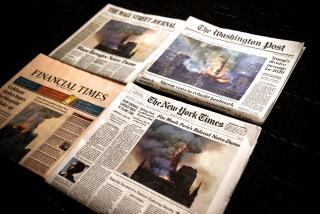Talk of the Town : New Yorker: The city is near fainting from the Tina Brown shock. Irony is in oversupply.
- Share via
A friend from New York writes:
“Perhaps you heard about the earthquake. We mean our Big One, the major shock that forced New York magazine mavens to double their lunchtime martini intake: Tina Brown, the noted glitz addict and editor of Vanity Fair, is becoming, God help us, editor of the New Yorker.
“Frankly, we’re concerned. Like everyone else, we have a certain fondness for the New Yorker. That doesn’t mean we actually read it--except perhaps while waiting for our annual physical--but we like it. More important, we like it just the way it is: staid, genteel, responsible, literary. Now, we’d be the last to bad-mouth Ms. Brown--but that’s only because everyone else has beaten us to it.
“In fact, just last night, at a small get-together overlooking the city, people were saying dreadful things about her. We couldn’t help but overhear one burly fellow exhort, ‘You know what the irony is about all this. Tina Brown has made her name with pictures--and she’s taking over a magazine of words.’ We enjoy ironies as much as anyone, so we had to agree.
“When one thinks of Vanity Fair, one thinks first of photos--a nude, expectant Demi Moore, a leather-clad Claus von Bulow, a shirtless Luke Perry with a revolver resting against his thigh. One doesn’t find photos of a shirtless Luke Perry in the New Yorker. Indeed, one doesn’t find photos at all. One finds fine writing and good journalism. It could be said that writing and journalism are not Ms. Brown’s strongest suits. She built Vanity Fair on a strong concept: insiders writing about insiders for insiders, as if to say, ‘Look, Muffy, a National Enquirer for us. ‘
“Ms. Brown loves gossip, and she manages to imbue every story, from frothy show-business profiles to pseudo-serious political pieces, with healthy doses of irrelevant personal detail. Had Ms. Brown been alive during Lincoln’s assassination, we would have no doubt learned the secrets of John Wilkes Booth’s sex life, and, of course, his favorite restaurants.
“Ms. Brown also loves powerful, successful people. She likes to feature them uncritically in her magazine and become their friends. When former New York News publisher Jim Hoge was mired in controversy, Vanity Fair fawned over him in a profile. By odd coincidence, Mr. Hoge is the godfather to Ms. Brown’s son. Calvin Klein and Ralph Lauren have been the objects of similar puff pieces. They’re not godfathers, but they are major Vanity Fair advertisers. In a letter that Spy magazine made famous, Ms. Brown endeavored to lure Michael Ovitz, the publicity-shy superagent, into her magazine. While Ms. Brown didn’t actually cross that line and promise that the article would be favorable, she was close enough that Mr. Ovitz could see the whites of her eyes. It was a journalistic breach that would have humiliated a lesser mortal, but Ms. Brown was unfazed. ‘It’s a good thing they didn’t find my letter to the Ceausescus,’ she told her staff. With Ms. Brown, you can never be sure when she’s joking.
“Fortunately, not everything in Vanity Fair is lite journalism. Ms. Brown can be quite stern when it comes to crazed foreign dictators or sociopathic murderers. Let the record show that she has staked out the moral high ground and disapproves of all of them.
“The New Yorker staff, which rebelled during the last changing of the editorial guard, has been oddly quiet since they were informed that Ms. Brown was coming to help them make a better magazine. We understand--they’re probably stocking up on copies of ‘Final Exit.’
“Others have been more vocal. ‘I think the New Yorker could use some juicing up,’ said one advertising executive, ‘and she could do it.’
“Perhaps. Of course, PBS could use some juicing up, too, but we wouldn’t recommend turning the whole operation over to Geraldo, would we?”
More to Read
Sign up for our Book Club newsletter
Get the latest news, events and more from the Los Angeles Times Book Club, and help us get L.A. reading and talking.
You may occasionally receive promotional content from the Los Angeles Times.










